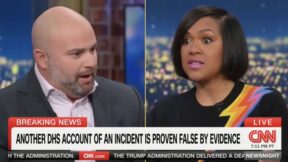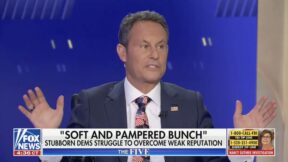‘Why Shouldn’t We Send it Back?’ Chief Justice Roberts Suggests Kicking the Can Down the Road on Trump Immunity Case
Chief Justice John Roberts suggested delaying the decision on former President Donald Trump’s immunity case while questioning Michael Dreeben, the attorney representing Special Counsel Jack Smith.
Trump has argued that he cannot be prosecuted in his D.C. criminal trial by Smith because he is protected by presidential immunity. The current immunity case being heard by the Supreme Court has already delayed the criminal trial, which was supposed to begin back in March.
During oral arguments on Thursday, Roberts asked Dreeben why the courts should not send the decision over immunity back to the lower courts, which would further delay the criminal trial likely until after the presidential election.
Dreeben responded that there is legal standing to not send the arguments back to the lower courts before adding counsel is “not endorsing a regime that we think would expose former presidents to criminal prosecution in bad faith for political animus, without adequate evidence, a politically driven prosecution would violate the Constitution.”
ROBERTS: You know how easy it is, in many cases, for a prosecutor to get a grand jury to bring an indictment and reliance on the good faith of the prosecutor may not be enough in some cases I’m not suggesting here. So if it’s tautological and those are the only protections that the Court of Appeals below gave, and that is no longer your position. You’re not defending that position. Why shouldn’t we either send it back to the Court of Appeals or issue an opinion making clear that that’s not the law?
DREEBEN: Well, I am defending the Court of Appeals judgment, and I do think that there are layered safeguards that the court can take into account that will ameliorate concerns about unduly chilling presidential conduct that concerns us. We are not endorsing a regime that we think would expose former presidents to criminal prosecution in bad faith for political animus, without adequate evidence, a politically driven prosecution would violate the Constitution…It’s not something within the arsenal of prosecutors to do. Prosecutors take an oath. The attorney general takes an oath. So, well, I don’t want to overstate the — your honor is concerned with potentially relying solely on good faith, but that’s an ingredient. And then the courts stand ready to adjudicate motions based on selective prosecution, political animus. This court relied on those very protections in the Vance case just two years —
ROBERTS: What what concerns me is, as you know, the Court of Appeals did not get into a focused consideration of what acts we’re talking about or what documents we’re talking about because of its adoption of what you termed. And I agree quite correctly, as it tautological statement, because the fact of prosecution was enough, enough to take away any official immunity, the fact the prosecution, they had no need to look at what courts normally look at when you’re talking about a privilege or immunity question.
DREEBEN: Well, I think I would take issue, Mr. Chief Justice, with the idea of taking away immunity. There is no immunity that is in the Constitution unless this court creates it today. There certainly is no textual immunity. We do not submit that. That’s the end of the story. United States vs. Nixon wasn’t a textually based case. Neither was Nixon vs. Fitzgerald. We endorse both of those holdings. But what is important is that no public official has ever had the kind of absolute criminal immunity that my friend speaks of, even with respect to the speech and debate clause. It’s very narrow. It’s focused on legislative acts. It’s not focused on everything that a congressman does, and it responds to a very specific historical circumstance that basically involved the two other branches, potentially harassing legislators and preventing them from doing their jobs. That’s why it ended up in the Constitution. Nothing like that ended up in, in the Constitution for the presidents. And that’s because one of the chief concerns of the framers was the risk of presidential misconduct. They labored over this. They adopted an impeachment, structure that separated removal from office as a political remedy from criminal prosecution. This departed from the British model. The British model was you get impeached and criminally. Prosecuted and convicted in the same proceeding. The framers did not want that. They wanted a political remedy in case a president was engaging in conduct that endangered the nation. He could be removed. He can’t be prosecuted while he’s a sitting president. That’s been the longstanding Justice Department position.
Watch the clip above via MSNBC.
New: The Mediaite One-Sheet "Newsletter of Newsletters"
Your daily summary and analysis of what the many, many media newsletters are saying and reporting. Subscribe now!






Comments
↓ Scroll down for comments ↓